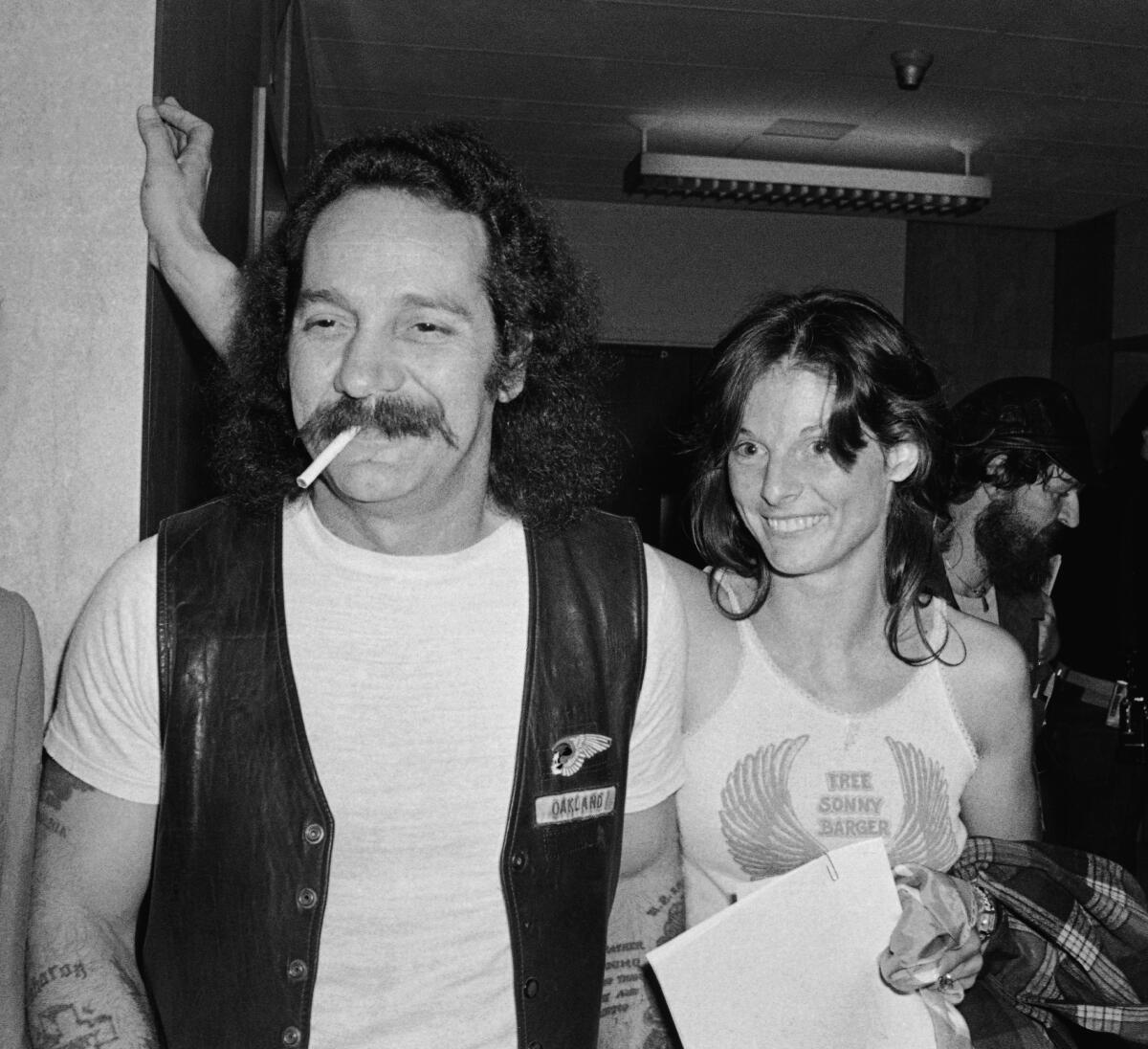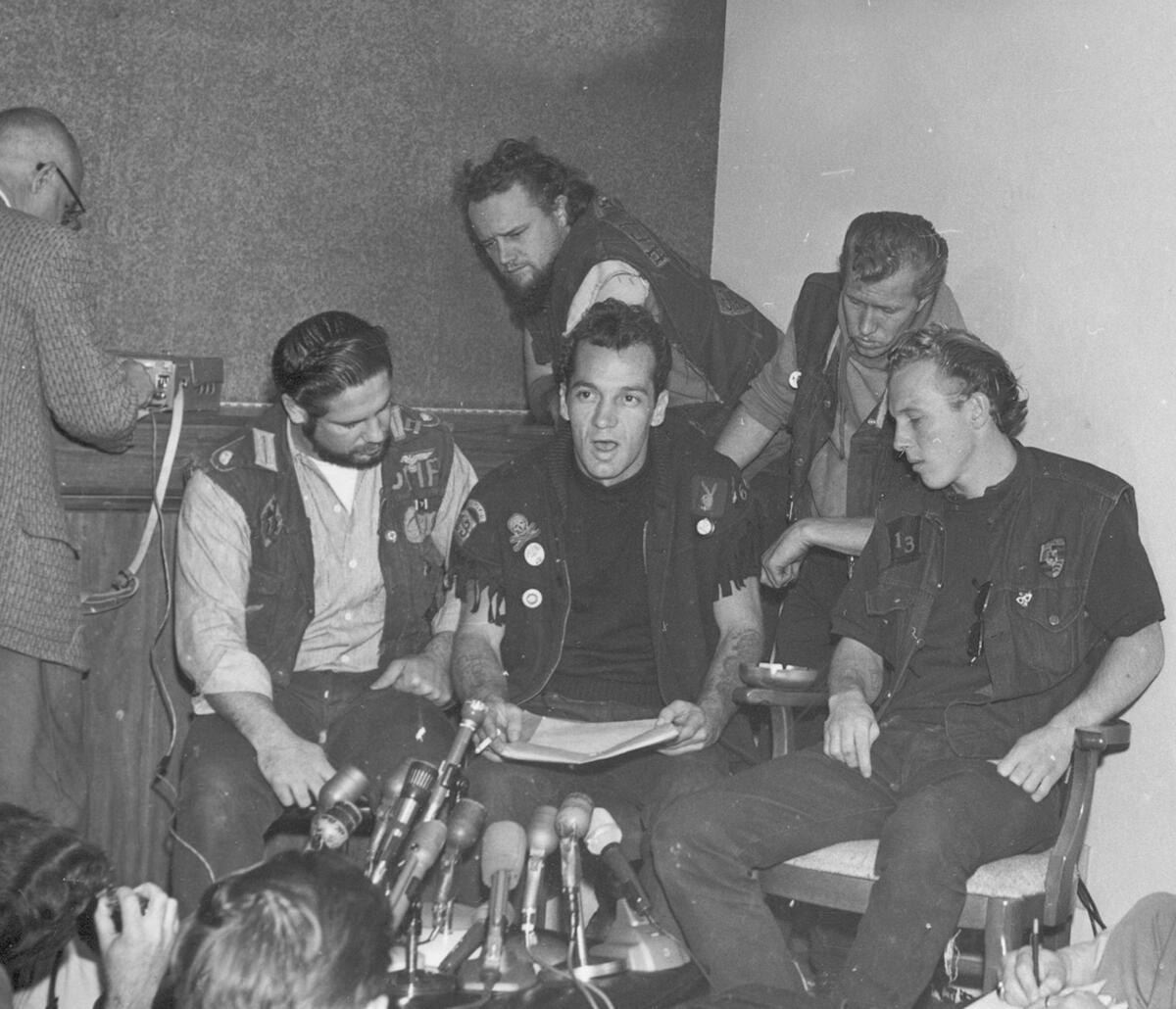Sonny Barger, counterculture force and face of the Hells Angels, dies

- Share via
Ralph “Sonny” Barger, the larger-than-life godfather of the Hells Angels who helped to transform a California-born motorcycle club into an icon of countercultural rebellion, forging a mythology of the outlaw-biker in pop culture, has died. He was 83.
Barger announced his own death “after a brief battle with cancer” in a pre-written Facebook post. “I’ve lived a long and good life filled with adventure. And I’ve had the privilege to be part of an amazing club,” he wrote. The post did not say where he died.
Barger served multiple terms in prison on convictions ranging from narcotics to conspiring to blow up a rival group’s clubhouse. When he got out, he became a prolific and bestselling author, lamenting the fact that as a felon he could neither vote nor own a gun but still had to pay his taxes.
Born in Modesto in 1938, a brawler from a broken home, he dropped out of school in 10th grade and joined the Army at age 16 on a forged birth certificate. He was kicked out when his deception was discovered.
Barger said he wanted to belong to a motorcycle club after watching Lee Marvin’s thuggish character in the 1953 movie “The Wild One.” The idea was to “ride a motorcycle, party and have a good time,” he said.
The Hells Angels was founded in the 1940s in Fontana, but Barger formed the Oakland chapter in April 1957. He became the club’s national president, its most visible and voluble figure.
The club acquired a reputation for mayhem, clashing with authorities and with antiwar demonstrators during the Vietnam War era. The club became a frequent target of law enforcement, which portrayed it as a methamphetamine-dealing crime syndicate.
When another motorcycle group sneered that the Angels comprised the 1% of “bad bikers,” the Angels began wearing “One-Percenter” patches.
Barger was a spokesman for the club’s ethos, which combined individualism (“we just want to be left alone”) with strict adherence to gang rules (“the toughest anywhere”), which included silence, loyalty and an instinctive willingness to fight for any other member (“any two Angels can take any other five guys”).

In his 1967 book “Hells Angels: A Strange and Terrible Saga,” Hunter S. Thompson described Barger as the Angels’ “maximum leader,” a fighter and philosopher who possessed “a steely, thoughtful quality” and “instinctive restraint that leads outsiders to feel they can reason with him. But there is also a quiet menace, an egocentric fanaticism tempered by eight years at the helm of a legion of outcasts …”
In December 1969, in an episode captured in the documentary “Gimme Shelter,” the Rolling Stones enlisted the Hells Angels to work security at a free concert at Altamont Speedway in the Bay Area.
Barger complained that concert-goers were kicking the Angels’ bikes. Yards from the stage, a member of the Angels fatally stabbed a gun-wielding 18-year-old concert-goer. He claimed self-defense and was acquitted.
As violence threatened to stop the concert, Barger claimed, he shoved a gun in Keith Richards’ ribs and ordered the guitarist to keep playing. Some have called Altamont a defining episode of the decade, the death knell of the flower-power movement, though Barger scoffed at the characterization.
In 1972, Barger was charged with killing a man who had supposedly sold bad drugs to the Angels, but a jury acquitted him. He later served a four-year term on heroin charges. In an interview, he said he considered prison, along with school and the Army, part of a well-rounded life. He said he had been charged with gun possession, tax evasion, kidnapping, murder, drug possession and conspiracy.
Barger was a three-pack-a-day smoker until laryngitic laryngeal cancer forced surgeons to remove his vocal cords in the early 1980s. He continued riding but wore a full-face helmet to protect the hole in his throat. In the late 1980s, he was convicted of conspiring to blow up the clubhouse of a rival motorcycle gang, the Outlaws. He serve a four-year federal term.
In an interview with The Times, Barger summarized Hells Angels history like this: “We started the club to have fun as a group. In the ‘60s, we started gettin’ in trouble. The ‘70s, we got into a little bit of crime and stuff, and by the ‘80s we were all in prison.”
Hells Angel Sonny Barger still believes fiercely in the notorious bike club he helped found. But at 61, he’s given up the hard living.
Barger kept a sign in his office that he said reflected his philosophy: “I treat everyone exactly the way I want to be treated. If they treat me good, I treat them better. If they treat me bad, I treat ‘em worse.”
But Barger tended to downplay the club’s reputation for criminality. “Catholics probably commit more crimes than we ever thought of,” Barger said. “Probably politicians commit more crimes.”
Barger wrote or co-wrote several books that sold hundreds of thousands of copies, including the bestselling memoir “Hell’s Angel.”
In “Let’s Ride,” Barger offered safety tips to motorcyclists. The book advised against riding angry, drunk or drugged up, and to be skeptical of other drivers’ turn signals.
Barger said he spent 12 or 13 years in prison in all.
“Not much,” he said, “considering all the fun I’ve had.”
More to Read
Sign up for Essential California
The most important California stories and recommendations in your inbox every morning.
You may occasionally receive promotional content from the Los Angeles Times.















